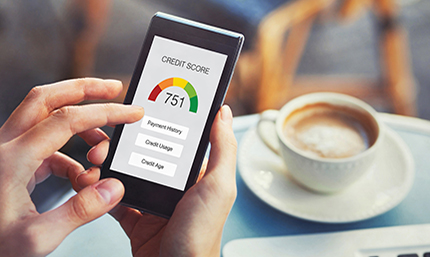News & Tips
How to Make a Budget

When you look at a map, it’s normal to find out where you are first before figuring out how to get to your destination. Making a budget will give you a full 360-degree view of your income and expenses, which helps determine your current financial position. Once you have a better idea of how you’re managing your money now, you can take steps toward reaching your financial goals. In this article, we’ll break down how to make a budget for beginners and how to stick to a budget once you’ve created one.
Why is a Budget Important?
Making a budget helps you keep track of your spending, allowing you to meet goals such as paying down debt or saving for emergencies or large purchases. Plus, budgeting may help you feel more in control of your finances and reduce your overall stress. In a survey, over 65% of Americans reported that their finances were a significant source of stress!
Ultimately, responsible money management can help you build or improve your credit. By budgeting, you’re more likely to make payments on time and reduce your overall debt-to-income ratio. With a higher credit score, you’ll have a better chance of getting lower interest rates and insurance premiums. Learn everything you need to know about building credit here.
(Psst, you can check your credit reports at no cost to you once a year at AnnualCreditReport.com, and it’s free to check your FICO® Score in your Online Banking account.)
How to Create a Monthly Budget
To get started, you’ll need something to record your expenses and income that best suits you, such as an Excel spreadsheet, our budgeting template, a mobile or online app for budgeting, or simply pen and paper. Try to budget objectively—in other words, make it a judgment-free zone. It’s not about criticizing your purchases; it’s about finding opportunities to reach your goals!
Step 1: Gather 12 months of financial statements.
To see your current spending patterns, you will need to look at your financial statements from the accounts you regularly use (i.e. checking accounts). This way, you can see your monthly, semi-yearly, and quarterly income and expenses, etc.
Helpful Tip: It may be easier to print your statements so you can cross items out once you’ve accounted for them, especially if you use multiple bank accounts or credit cards.
Step 2: Calculate your total monthly income.
Sources could include paychecks, child support, Social Security, alimony, disability, etc.—these should be consistent monthly numbers. If you get paid twice a month, multiply your net pay by two because that’s what you’re using for expenses. Your net pay, also known as your “take-home pay,” is the number you see after your employer deducts your taxes, 401(k) contributions, and other benefits.
Avoid using variable income when calculating your total amount. For example, if you typically receive two paychecks per month, make sure you don’t account for the occasional third paycheck. If your income is irregular because you’re a contractor, self-employed, a freelancer, a gig worker, or receive commissions—all on a regular basis—add all the money you earned in the last year (subtract about 15% of it for taxes) and divide by 12 to help you get a better idea of your average monthly income.
Step 3: Tally up the expenses you have to pay each month.
First, list your fixed expenses for necessities: These expenses could include rent or mortgage payments, loan payments, insurance premiums, and your cell phone bill.
Then, list your variable expense amounts for necessities: These costs could include utilities, grocery bills, transportation costs, and medicines. Because these items don’t have fixed values, it’s helpful to add them up in the last year and divide by 12 to get the monthly average for each of these.
Step 4: Add up your leisure expenses.
Your leisure expenses, also known as your discretionary spending, are your “wants” and could be anything you could live without if necessary. These might include subscriptions, hobby expenses, food delivery fees, and streaming services, to name a few.
Step 5: Subtract expenses from your income.
The last step on how to make a budget. After adding up your expenses for your needs and wants, subtract that amount from your monthly income. This budget calculator can help. If you have money left over, consider setting up monthly automatic transfers to a savings account or depositing funds into a CD with a high-interest rate (once you’ve established an emergency funds account).
If you’re falling short, it’s time to see where you can cut back on unnecessary expenses, refinance loans, price shop for lower insurance premiums, or look into extra-earning opportunities.
Here are some suggestions to help you save more: use grocery store apps and coupons, buy generic over name-brand items, wait for seasonal sales for big purchases, eat more meals at home, shop at second-hand stores and dollar stores, and trade services with friends and families. In addition, these articles on how to consolidate debt and creative ways to save money may be able to help you.
The ultimate goal of making a budget is that you’re not spending more than your total net income every month, allowing you to get on the road to financial freedom.
Managing Expenses Made Easier
Our budgeting calculators can help you analyze your spending and identify savings opportunities.
How to Stick to Your Budget
Now that you’ve categorized your current income, necessary expenses, and leisure expenses, it’s time to implement a plan to stick to your budget.
1. Make SMART goals for your finances.
SMART stands for specific, measurable, achievable, relevant, and time-bound. Are you looking to save more, spend less, or cut down on debt? It’s crucial to have an emergency savings account with 3-6 months’ worth of expenses. Be sure to break your goals down into specific final and monthly realistic amounts to help you achieve both short- and long-term goals. Decide on deadlines for those goals.
2. Choose a budget plan that is right for you.
Keep in mind that budgeting methods are helpful guidelines that are customizable, and they’re not hard and fast rules to live by. Here are the most common approaches that can provide more structure:
- Percentage-based budgeting:
- What is the 50-30-20 budget rule? The idea of this budgeting method is simple—50% of your net income goes toward necessary expenses, 30% goes toward your leisure expenses (your “wants”), and the final 20% toward savings and debt. First, put the 20% toward paying more than the minimum payment amount on any debts owed. If all your debts are paid, the 20% will go into your savings and retirement funds.
- What is the 70-20-10 budget rule? Alternatively, suppose you’re starting out with budgeting and need something more simple. In that case, you could designate 70% of your income toward bills and spending (both your “wants” and your “needs”), 20% toward saving and investing, and 10% toward debt repayment or donations.
- Cash envelope budgeting: If you’re a chronic overspender, this budget type may be the most helpful. Exactly as it sounds, your income is in the form of cash that you divide into designated envelopes every month. You’re not allowed to spend more than what’s in each envelope for each category. The downside with this approach is that many bills require electronic payments, so you could also check out mobile apps that allow you to implement this method digitally.
- Zero-based budgeting: This budgeting type is about designating your income toward specific categories (savings, bills, etc.) every month down to the last dollar so that you have $0 at the end of each month. For some, this method may be more difficult to stick to because it requires a detail-oriented approach.
3. Track, review, reward.
It’s helpful to get in the habit of tracking your expenses regularly (daily or weekly) to stick to your budget. Continue to review your budget weekly so that you can adjust accordingly. Some days will require additional expenses, or you may need to factor in additional unexpected income. Share your goals and progress with another person who can support you along the way and provide you with accountability. For every week that you stay on track with your budgeting goals, be sure to give yourself a little treat to stay motivated!
You can learn more about achieving financial peace with our guide here.
Our Budgeting Calculators Can Help
Now you know how to make a budget, and you’re one step closer to financial freedom! We also offer several budgeting calculators that include charts and graphs if you’d like visuals of your spending categories. Check out our Financial Wellness page for additional calculators, articles, recommended products, and more for multiple financial journey stages.
If you need a hand, we’re here to help. Our Credit Solutions team can provide you with personalized assistance and may be able to offer you a loan extension, repayment plan, or loan modifications. In some cases, they may be able to connect you with additional funding that the state or government is providing, depending on your situation.
Every budget looks different, but with a little bit of time and a proper approach, you can change the way you see your budget and how you spend to stay inside those guidelines.






















































